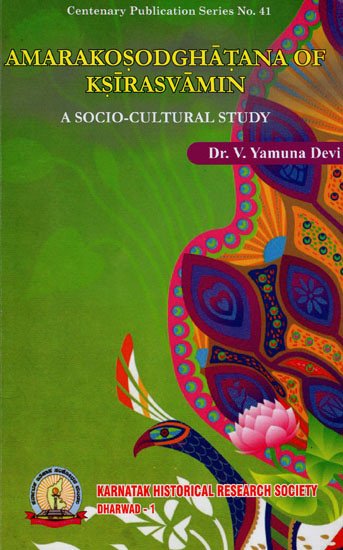Amarakoshodghatana of Kshirasvamin (study)
by A. Yamuna Devi | 2012 | 77,297 words | ISBN-13: 9788193658048
This page relates ‘Introduction (Kshirasvamin: Personal details)’ of the study on the Amarakoshodghatana of Kshirasvamin (in English) which represents a commentary on the Amarakosha of Amarasimha. These ancient texts belong the Kosha or “lexicography” category of Sanskrit literature which deals with the analysis and meaning of technical words from a variety of subjects, such as cosmology, anatomy, medicine, hygiene. The Amarakosa itself is one of the earliest of such text, dating from the 6th century A.D., while the Amarakoshodghatana is the earliest known commentary on that work.
Introduction (Kṣīrasvāmin: Personal details)
Kṣīrasvāmin and his commentary Amarakośodghāṭana on Amarakośa have both been often referred to and cited by many commentators on Amarakośa and also by other writers of different genres of literature. However, only little information is available about his date, native place and his life. Scholars all over the world have made efforts to fix his date and native place from his own writings and from external sources. This has resulted in varied opinions differing vastly from one another.
Only Kṣīrataraṅgiṇī, a commentary by Kṣīrasvāmin on the Dhātukośa ascribed to Pāṇini, provides the information about him, i.e., his father's name was Īśvarasvāmin.
This is found in the colophon of the Kṣīrataraṅgiṇī which reads–
bhaṭṭeśvarasvāmiputrakṣīrasvāmyutprekṣitāyāṃ kṣīrataraṅgiṇyāṃ... |
In no other place in any of his available works can one find information on Kṣīrasvāmin's life.
Three details about him can be inferred from his own works–
(i) Kṣīrasvāmin, in the opinion of Prof. Mm. Yudhiṣṭhira Mīmāṃsak[1], seems to belong to the family of reciters of Kaṭhaśākhā (Yajurveda). He bases his inference on the example cited by Kṣīrasvāmin in the context of commenting on the ' Yaj dhātu' in Kṣīrataraṅgiṇī (I. 729). Prof. Mīmāṃsak feels that the particular mention of Kaṭhaśākhā of the Yajurveda (which consists of more than hundred branches) suggests that Kṣīrasvāmin belonged to that particular sect of Brahmins.
(ii) Kṣīrasvāmin seems to have been a devotee of Śiva. This can be understood from the introductory verse[2] of Amarakośodghāṭana and in many places of the commentary.
(iii) Kṣīrasvāmin seems to consider himself as a great scholar. In the introductory verse of Amarakośodghāṭana (4, 8) Kṣīrasvāmin says that he has taken up a challenging task of commenting upon the words which has been tried by many who have failed in their efforts. He further remarks that the words born of Viśvasṛja were refined by sages; but these got corrupted due to the association of the uncultured; at this juncture Kṣīrasvāmin declares that Vāgdevī took refuge in him and accordingly he had written six vṛttis:
bhagnā ābhidhānakṛto vivarītāraśca yatra vibhrāntāḥ |
nāmāni tāni bhaṅktuṃ gahanamaho ādhyavasitāḥ smaḥ ||
jātā viśvasṛjaḥ krameṇa munibhiḥ saṃskāramāpāditāḥ śabdāḥ saṃvasanādasādhubhirapabhraṣṭāḥ stha bho bhrātaraḥ |
vāgdevyādya kṛtā madekaśaraṇā mātrā yato 'smānmayā nyāyye vartmani vartanāya bhavatāṃ ṣaḍ vṛttayaḥ kalpitāḥ ||
Footnotes and references:
[1]:
Vyākaraṇaśāstra kā itihās, Vol. II, pp. 92-101
[2]:
diśyācchivāni śivayostilakāyamānaṃ gorocanārucilalāṭavilocanaṃ naḥ |
ānyonyagāḍhaparirambhinipīḍanena piṇḍībhavan bahiriva sphuṭitonurāgaḥ ||
